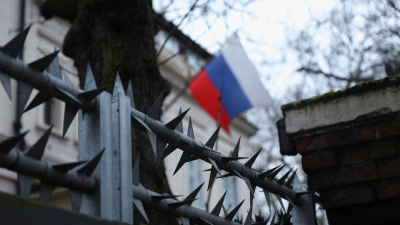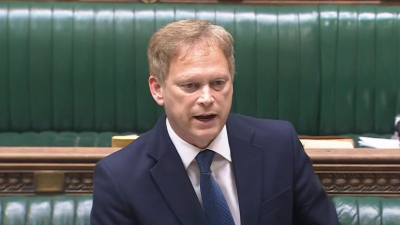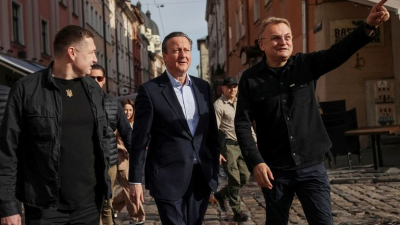In the intricate web of politics, Liz Truss and Donald Trump seem to share more than a mere coincidence of three letters at the onset of their surnames. Delve deeper, and you'll find a tapestry woven with threads of striking parallels. Both heralded themselves as renegades, outsiders challenging the status quo, yet their trajectories soared to the zenith of power: Truss as the Prime Minister of the UK and Trump as the President of the United States.
Their reigns, however, echoed with a symphony of discord, drawing ire from opponents and even fissures within their own parties. Truss's brief tenure in 10 Downing Street was marred by economic turmoil, her impulsive policies ushering in chaos and ultimately leading to her premature exit after a mere 49 days. Meanwhile, Trump's refusal to concede defeat in the 2020 election reverberated globally, culminating in the harrowing events at the Capitol, where he lauded the insurrectionists in a desperate bid to cling to power.
Yet, just when obituaries were being penned for their political careers, fate wielded its capricious hand once more. Like phoenixes from the ashes, they emerged, resilient and unyielding, commanding respect as stalwarts within their respective spheres. Trump, now positioned as the frontrunner in the race against Joe Biden, stands poised for a potential reclamation of the White House. Meanwhile, Truss, undeterred by past setbacks, boldly asserts, "I definitely have unfinished business.
Truss, ever the chameleon, has undergone a metamorphosis from her origins in a left-wing household, initially advocating for the abolition of the monarchy as a young Liberal Democrat. Her journey traversed the realms of Remain advocacy during the 2016 EU referendum, only to pivot sharply towards staunch Brexiteer convictions.
This shape-shifting narrative finds its crescendo in Truss's forthcoming memoir, "Ten Years To Save The West," a title both grandiose and introspective. Despite its focus on the tumultuous 49 days that marked her fall from grace, Truss imbues the narrative with broader significance, casting her personal saga as a microcosm of a global ideological struggle. Her treatise concludes with a call to arms, advocating for the dismantling of the leftist state, restoration of democratic accountability, and the triumph of conservatism across the free world.
In a political landscape characterized by flux and fervor, Liz Truss emerges as a formidable figure, embodying the paradoxes and complexities of modern governance. As she strides forward, intent on shaping the future, her journey serves as a testament to the enduring allure of power and the indomitable spirit of reinvention.
In a political spectacle reminiscent of a high-stakes comeback tour, Liz Truss finds herself cast in a role that even she might not have anticipated: that of a radical right-wing populist. This characterization, elucidated by Tim Bale, a distinguished professor of politics at Queen Mary University of London and the author of "The Conservative Party After Brexit," underscores Truss's metamorphosis into a figure who, much like Trump, vociferously denounces what she perceives as "extremist environmentalist dogma and wokeism.
Truss's narrative paints a bleak portrait of a Britain ensnared in the clutches of leftist ideologies, mirroring Trump's ominous vision of "American carnage" if not for his intervention to "Make America Great Again." Aligning herself firmly with Trump, Truss publicly endorses his bid for reelection, a departure from the conventional practice of British political leaders refraining from meddling in foreign elections. Her rationale? A conviction that a resolute America under Trump's leadership safeguarded global stability, particularly in the face of authoritarian regimes in China, Iran, and Russia.
Yet, amid this ideological kinship, Truss diverges from Trump in her unyielding aggression towards adversaries, particularly authoritarian regimes, a stance that sets her apart from some of Trump's own acolytes. While Trump's admiration for dictators and questionable alliances raise eyebrows, Truss's unrelenting hostility towards totalitarian regimes earns her accolades from the stalwarts of the Heritage Foundation, an institution known for its unwavering commitment to conservative principles. Dubbed "Prime Minister Truss" in American parlance, she garners praise for her purported grasp of U.S. politics and the trajectory of its conservative movement, despite her tenuous familiarity with the legacy of the real Margaret Thatcher.
Truss's idiosyncrasies, however, are not confined to her political maneuvering; they extend to her propensity for theatricality, akin to Trump's penchant for spectacle. Both exhibit an imperviousness to ridicule, navigating a post-truth landscape where subjective narratives supersede objective realities. In their worldview, accountability is a foreign concept, with scapegoats aplenty should endeavors falter—a narrative that absolves them of responsibility in the face of adversity.
In the grand theater of politics, where personas are carefully crafted and alliances forged, Liz Truss emerges as a figure whose trajectory defies convention, embodying the paradoxes and complexities of contemporary governance. As she navigates the tumultuous currents of global politics, her symbiotic relationship with Trump underscores the enduring allure of populism and the ever-shifting sands of political allegiance.
In the candid pages of her memoir, Liz Truss offers a revealing glimpse into her tenure as prime minister, painting a portrait of a leader grappling with the complexities of economic governance. Admitting to a staggering oversight regarding crucial facets of the national economy, such as the vulnerability of LDI pension funds, Truss levies criticism at the Bank of England for failing to alert her to these pressing concerns. She asserts that the Office of Budget Responsibility (OBR) and the Treasury undermined her efforts, despite her refusal to grant the OBR advance scrutiny of her mini-budget and her swift dismissal of the Treasury's top civil servant on her inaugural day.
Her narrative takes a scathing turn as she lambasts what she perceives as an entrenched network of bureaucratic impediments—quangos, independent regulators, and assorted public sector bodies—that hinder ministerial autonomy at every juncture. Proposing radical measures, Truss advocates for the abolition of the OBR, the United Nations, and even the UK Supreme Court, alongside calling for the resignation of the current governor of the Bank of England.
At the core of Truss's vision lies a fervent belief in "democratic accountability," a notion she interprets as seizing absolute power by subduing dissenting factions and neutralizing any obstacle to her authority. Her alliances extend beyond national borders, as evidenced by her shared platform with Steve Bannon, the controversial political strategist linked to the Trump administration, at the Conservative Political Action Conference (CPAC). Truss's silence in the face of Bannon's endorsement of far-right figure Tommy Robinson speaks volumes, underscoring her tacit acceptance of incendiary rhetoric.
Despite the debacle of her premiership, which exacerbated the cost of living crisis for countless mortgage holders, Truss remains a resilient figure within Tory circles, steadfastly deflecting criticism while maintaining a veneer of credibility. Labour leader Sir Keir Starmer has not minced words in his appraisal of Truss, likening her and her supporters to the "political wing of the Flat Earth Society." However, her persistence in the political arena persists, buoyed by a selective echo chamber of sympathetic journalists handpicked for interviews upon the publication of her memoir.
As the political landscape continues to shift, Truss's indomitable presence serves as a reminder of the enduring allure of power and the capricious nature of public perception. Despite her missteps and controversies, she remains a polarizing figure, embodying the paradoxes and contradictions of contemporary politics.
Amid the tumult of post-insurrection politics, the Republican Party faced a critical juncture following the events of January 6th. With the specter of disqualification looming over Trump's second impeachment trial, Senate Republican leader Mitch McConnell briefly entertained the notion of severing ties with the former president. However, pragmatism prevailed as Republicans calculated that retaining Trump would serve their electoral interests.
Meanwhile, closer to home, Liz Truss's recent political reincarnation has been met with skepticism and derision. Yet, dismissing her as inconsequential would be a grave error. Truss harbors ambitions beyond mere political survival; her agenda includes reshaping the Conservative Party's trajectory, steering it decisively towards the right in the aftermath of a potential electoral defeat. With a keen eye on the internal dynamics of the Conservative Party, Truss recognizes that victory hinges not on broad-based appeal but on securing the allegiance of a select cadre of voting members.
Her previous ascendancy to the premiership underscores the enduring allure of her brand of conservatism among a faction of the party faithful. In a political landscape characterized by shifting tides and entrenched allegiances, Truss represents a potent force capable of perpetuating Trumpism's influence within British politics. As the specter of a re-elected Trump looms large, her leadership or senior shadow ministerial role could serve as a conduit for transplanting Trumpian ideology onto British soil.
However, the Conservative Party would be wise to proceed with caution, lest they find themselves shackled to a five-year odyssey of opposition under Truss's far-right tutelage. As the party grapples with its ideological identity in the post-Brexit era, the allure of Truss's borrowed brand of conservatism may seem tantalizing to some but could spell perilous consequences for the party's long-term viability.
In the chess game of politics, where strategic calculations intersect with ideological fervor, the trajectory of both the Republican Party and the British Conservative Party hangs precariously in the balance. As Trumpism casts its shadow over the global political landscape, the decisions made today will reverberate far into the future, shaping the contours of conservative politics for years to come.
In the ever-evolving saga of conservative politics, the choices made by the Republican Party and the British Conservative Party carry profound implications for the future of governance on both sides of the Atlantic. As Liz Truss emerges as a formidable force, poised to shape the trajectory of British conservatism, the specter of Trumpism looms large, casting a long shadow over the ideological landscape.
However, amidst the allure of populist fervor and far-right ideology, both parties would be wise to heed the lessons of history and tread cautiously. While short-term electoral gains may seem tempting, the long-term ramifications of embracing Truss's brand of conservatism or perpetuating Trumpism could prove detrimental to the core values and electoral prospects of each party.
As the political pendulum swings and new challenges emerge, the true test of leadership lies not in succumbing to the allure of populist rhetoric but in charting a course guided by principle and pragmatism. In navigating the turbulent waters of contemporary politics, the Republican Party and the British Conservative Party must strike a delicate balance between ideological fidelity and electoral viability, lest they find themselves consigned to the annals of history as casualties of their own making.







